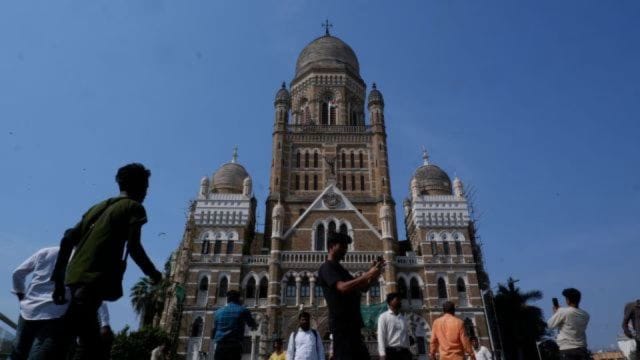Explainer: Why BMC move to issue notice to Mumbai well owners can lead to man-made crisis
In some notices BMC said the wells are breeding hotspots for mosquitoes and in some notices it said well owners don't have the right to supply groundwater to tankers without the new CGWA licence.
 In February 2023, a similar move of BMC triggered a man-made water crisis after the tanker association went on a flash strike as a sign of protest. (File Photo/Pradip Das)
In February 2023, a similar move of BMC triggered a man-made water crisis after the tanker association went on a flash strike as a sign of protest. (File Photo/Pradip Das)In the past few weeks, the Brihanmumbai Municipal Corporation (BMC) has been sending notices to the owners and operators of borewells and ring-wells in Mumbai asking them to either shut those facilities or obtain a licence from the Central Ground Water Authority (CGWA). These borewells are key sources of ground water which is extracted and supplied through tankers in different parts of the city.
In February 2023, a similar move of BMC triggered a man-made water crisis after the tanker association went on a flash strike as a sign of protest.
Why the BMC is sending notices to well owners ?
Ring wells and bore wells are natural and artificial wells that are constructed for accessing underground water for daily usage. These wells are usually open and get recharged during the monsoon. The civic body, in its notices, has mentioned multiple causes. In some notices they said that these wells are serving as breeding hotspots for mosquitoes and insects and in some notices the civic authorities have mentioned that the well owners don’t have the authority to supply ground water to tankers without the new CGWA licence – which is being issued only if a well user fulfills the criteria that are mentioned the latest CGWA guidelines published in 2020.
Why is Mumbai so dependent on ground water?
Mumbai being an island city is surrounded by the sea from three sides. As a result, the city gets its potable water from seven lakes that are situated in the satellite districts of Thane, Palghar and Nashik. At present, BMC supplies 3,850 million litres daily (MLD) of potable water, against a demand of 4,200 MLD. For non-potable purposes like industrial and commercial usage – the city’s water comes from the ring and borewells via tankers. Considering the sea water is high on saline level and the creek water has sewage discharged on them this water becomes unfit for any kind of usage. According to civic officials, Mumbai has a network of 1,200 wells and borewells. However, the officials pointed out that as there is no holistic policy for maintenance of groundwater resources, Mumbaikars depend on BMC’s supply for their drinking needs.
Why will BMC’s move trigger a man-made water crisis in Mumbai ?
The BMC has now asked the well owners to obtain a fresh CGWA licence – a mandate as per the latest CGWA guidelines that came into force in 2020. The civic body in its notices has maintained that it will take legislative action against well operators who continue to supply water to tankers without having a new CGWA licence. This move will affect the tanker business entirely. Daily these tankers supply 200-2000 MLD of water in different pockets of Mumbai. This water is being used for commercial purposes as well as in ongoing infrastructure works such as the road concretisation, coastal road project, Metro works, bullet train project. Besides, the tanker water is also being used for other important purposes like cleaning of railway coaches, maintenance of public roads, laws and gardens, maintenance of banquet halls and commercial public spaces like lawns. If the BMC disallows the well owners to supply water to tankers, water will not reach for these activities leading them to stop work and maintenance. A similar incident took place in 2023 when the entire city loomed under the water crisis for five days after the Mumbai Water Tankers Association (MWTA) went for a strike.
What are new CGWA norms ? Why is MWTA protesting it ?
The new CGWA rules mandate the well owners to limit supply only to one tanker from a particular borewell. The rules also state that each well owner should have an area of 200 square metres and flow meters needed to be installed in wells for proper monitoring of the supply. However, the tanker owners have maintained that these rules are not possible to follow in a city like Mumbai.
“In a densely populated city like Mumbai where will you get a land strip that will be 200 square metres and could be only used for setting up well? There is no CGWA office in Mumbai where we can go for consultation and the meters that they are saying are not available anywhere in Mumbai markets. Therefore, even if the well owners apply for a licence today it will be rejected,” Ankur Sharma, MWTA spokesperson, told The Indian Express.
At present, MWTA has 1,800 registered tankers with it. Each tanker has a capacity of 500-20,000 litres and each borewell caters to 10-15 tankers depending on the water table.
“Also, the CGWA rules are applicable for potable water only. We (tankers) only supply non-potable water. Then why should we opt for a licence for supplying drinking water and provide impure water instead. Will that not be another violation also ?” asked Sharma.












